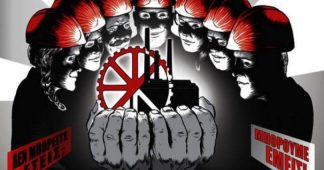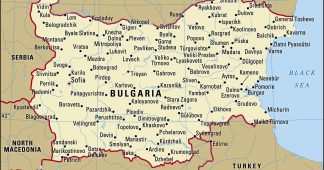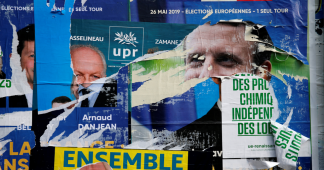With the rise of the far right it is worth considering the issue of identity politics and the left. This is a type of politics that takes identity, often essentialised, as the central category for organisation and analysis. Its left-wing variant is suspicious of power, preferring to engage in academic taxonomies of oppression which prove incapable of addressing underlying causes.
On the right, identity politics is leveraged to deliberately divide and fracture workers, pitting them against each other, most frequently on the basis of race, gender, religion, or nationality.
The left variant of identity politics emerged from the post-modern paradigm that has come to dominate much of progressive politics within the academic world. As the past thirty years have shown, a politics that over-emphasises individual identity and difference over the potential to unite disparate groups under shared class interests leaves much to be desired. Nevertheless the focus on identity and difference is necessary, even if it served as an over-correction to certain historical tendencies on the left that treated the working class as a homogeneous, abstract, uniform mass.
The problem here is not universality but rather abstract universality. In the overreaction against such descriptions, the post-modern position throws the baby of concrete universality out with the bath water of abstract universality. Forgoing universality as a concept and revelling in difference has led to nothing but the fracturing of progressive forces into small cliques incapable of pursuing a collective emancipatory project with the power to address the needs of the majority in society.
Our model of class must recognise difference while stressing the concrete universality of class, based on the subject’s relationship to the means of production. As the Marxist philosopher and founder of the school of critical realism, Roy Bhaskar, states, you cannot bring them [the unionised male European worker and the female Bangladeshi sweatshop worker] together by asserting the primacy of a traditional model of class over the real interests and feelings and needs of that Bangladeshi woman. You have got to do it by appealing to the commonality of their enemies and then the particularity of their own interests and differences. Roy Bhaskar, “Critical realism and the left,” in From Science to Emancipation: Alienation and the Actuality of Enlightenment (London: Routledge, 2012), p. 190–201.
Class is the concrete universal, the unifying commonality that has the potential to unite all workers. Yet there are social structures and forms of oppression that impede this unity. These should not be dismissed as secondary concerns: it must be shown that the vines of racism, sexual discrimination, xenophobia etc. rely on the healthy tree of capitalism, and that only through a universal struggle to destroy that tree’s root can our collective concerns be adequately addressed.
With this in mind, let us consider the present moment, in which most people are feeling considerable pain because of the economic and public-health consequences of organising society around the accumulation of profit, at the expense of public need. The far right has recognised and leveraged this pain and discontent, displacing it onto spurious issues of identity, such as the wearing of face-masks or attempts to blame immigrants for shortages of housing and health services.
It should be clear that the average person who turns up to protests surreptitiously organised by the far right is not a fascist but rather has legitimate grievances that are being manipulated and channelled into dangerous dead ends by pseudo-intellectual charlatans of diminutive stature.
If class offers the means of uniting the majority of working people to pursue their common emancipation from the constraints of capital but this unity is hindered by external factors, how can we think about organising on a class basis if issues of identity seem to take precedence? Here an analogy may help us.
We know that water has a general tendency to flow downhill, because of the effect of gravity; yet the simple presence of the law of gravity doesn’t mean that the course of water is guaranteed to flow along a predetermined path. All sorts of structures can be built to divert and channel the water away from its original course. One who insists that water should flow downhill of its own accord and along a predetermined path, ignoring diversions and dams, has a tenuous grasp of reality. If we wish to enable the water to flow along its proper course towards the sea there are structures that must be removed and new ones that can be erected to help channel the many weak trickles into streams, and streams into a river capable of exerting tremendous force in its movement.
So it is with issues of identity and class struggle. Certain identity positions established by the right, such as unionism, may hinder the development of class-consciousness like dams, others may simply act as parallel streams flowing in the same direction but independent and weaker outside the torrent of class struggle, ultimately petering out before they reach their goal.
The goal of the communist movement should be to tear down the barriers where they exist and incorporate the streams in the broad river of class struggle. This cannot be achieved by ignoring barriers or chastising people for not placing class above those interests, such as race or gender, that they feel most pressing to their personal experience at a given moment. We must show how their interests are interdependent with, and not independent of, class.
Finally, how do we address the anti-maskers and the far right? The first thing that must be acknowledged is that the anti-mask movement is not really about masks. The mask, or, more accurately, the absence of the mask, is an overdetermined signifier that unites a broad group of discontented working people who are suspicious of the opinions of experts. In this sense anti-mask politics is a politics of identity, division, and scepticism.
With this in mind, we must not be too quick to blame people after experiencing the so-called economic expertise that both created and “fixed” the 2008 economic crisis—an expertise that has left people worse off than they were a decade before. Now we witness health experts issuing sound, scientific public-health advice that is not supported in turn by economic policies capable of protecting people’s jobs and livelihoods, thanks to the skewed priorities of Fine Gael, Fianna Fáil, and the Green Party.
It is no surprise that so many people have reacted as they have. Instead of turning against the economic system that is the cause of their suffering, friends and neighbours have been fed poisonous lies and conspiracies by right-wing forces that the advice of health experts trying to protect them is the very cause of their problems.
While liberals and the media sneer at these people, dismissing them as the uneducated dregs of society, we should recognise that their grievances and fears are real and not entirely irrational. We must push back against anti-scientific talking-points of the far right against masks that cause nothing but harm to the communities they seek to exploit, while at the same time recognising the just scepticism about neoliberal economic expertise and acknowledging that fears and grievances over the future are real. We must stress that the cause of these grievances is to be found in the mode of production that gives priority to profits over human life and not a piece of cloth that can save lives. We must push hard against attempts to lump doctors and nurses in the same category as establishment politicians and neoliberal economists.
If we succeed we can break down the dam of anti-intellectual and dangerous demagoguery offered by the far right and offer a path for thousands of people to properly address their particular concerns through the universality of class struggle. This is why identity politics is not enough: only a class politics capable of integrating difference in its model can offer a way forward
Published at socialistvoice.ie











